By John Horwood and Dick Batchelor
In the 70-year history of Point Leo SLSC a remarkable total of eleven members have represented Australia in the Olympic Games, ranging from the 1948 Olympics in London to the 2000 Sydney games.
John Marshall
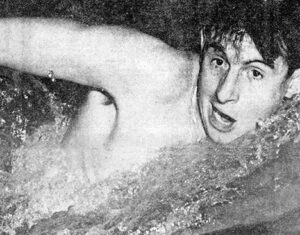
Point Leo SLSC co-founders Dick Ellis and the late Alan Forster scored a major coup when they persuaded John Marshall to become a foundation member of the club in 1955. Born in 1930 and by now married with a young son, Marshall had represented Australia at two Olympics (London, 1948 and Helsinki, 1952) and was aiming to make the team for the forthcoming 1956 Melbourne Olympics. At London Marshall won a silver medal in the 1500m freestyle and a bronze in the 400m. Subsequently while studying in the USA he broke virtually every freestyle world record (in yards and metres) at distances up to one mile but injury and illness later saw him swim well below his best in Helsinki.
Marshall passed his bronze exam at Point Leo on 4 March, 1956. In a busy eight-day period to 2 December, 1956 he finished second in the Interstate surf race at the Australian Surf Championships and third in the belt event, swam in a heat and placed fifth in the 200m Butterfly final at the Melbourne Olympics and the following day he led the Australian Senior Surf Race before finishing wide of the flags to take second! His life was tragically cut short by a car accident in January, 1957. Marshall was one of Point Leo’s most enthusiastic members and one can only wonder what great things he might have continued to achieve. In 1973 he was inducted into the International Swimming Hall of Fame.
Paul Nash
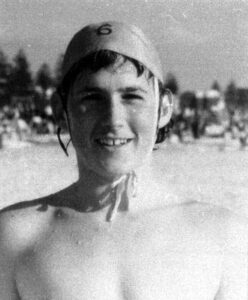
Paul Nash passed his bronze exam at Point Leo in 1975 and the following year swam in the 1500m selection trial for the Montreal Olympics. He finished third to Steve Holland and Max Metzger in the trial but had to endure an agonizing wait to see if the fact he had been born in Great Britain (in 1959) ruled him ineligible for Australian selection. However, Nash had already bought some insurance by earlier winning the British 1500m title under their Olympic qualifying time. Relieved at last to be wearing the green and gold in Montreal, Nash finished second in heat three of the 1500m but his time (15:46.51) was not fast enough to make a remarkable final, in which the first three place getters swam under the world record. Nash’s time was actually 11th fastest out of the 31 starters in the most grueling swimming event at the Olympics – a fine effort.
Prior to gaining his Bronze and competing at Montreal Nash was already an experienced surf swimmer. At Victorian State level he won the 1973/74 Cadet Surf Race and in 1975/76 won both the Junior and Senior Surf Race events. He added an Australian title by winning the 1973/74 Cadet Surf Race. Nash later won bronze medals at the 1975/76 Australian titles in the Junior Surf Race, the Junior Surf Teams and the Senior Surf Teams – three medals in one day!
Bruce Featherston
Born in 1952, Bruce Featherston gained his bronze qualification at Point Leo on 7 November, 1970. As one of Australia’s top medley swimmers his focus was always on gaining selection for the 1972 Munich Olympics but when time allowed he did compete in some R&R and surf events for Point Leo, finishing third in the 1970/71 Victorian Senior Belt race.
The swimming events at the Munich games were dominated by the US champion Mark Spitz, who won a then unprecedented seven golds. Featherston took on a big program comprising the 200 Backstroke, 200 Individual Medley, 400 IM, 4×100 Freestyle relay and 4×200 Freestyle relay but in the individual events his heat times were not fast enough to make the finals, although he did finish second in his 200 IM heat. In the 4×200 relay heat the Australian team finished first to win a start in the final, where they finished fifth. Unfortunately, Featherston did not get to swim in that final as his place had been taken by another swimmer.
Greg Fasala
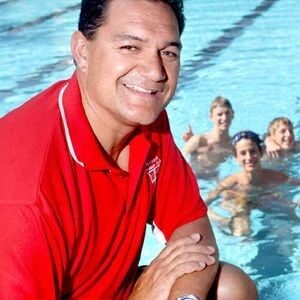 Born in 1965 and a proud member of Point Leo after passing his Bronze on 23 December, 1979, Fasala found fame as a member of Australia’s “Mean Machine” sprint relay freestyle team, their trademark shaven heads eliminating the need for swim caps! At the 1984 Los Angeles Olympics Fasala’s 4×100 Freestlye relay team finished a close second in a time of 3:19.68 to the US team which won in 3:19.03. Earlier in the 1982 Commonwealth Games the Mean Machine, including Fasala, won gold. Fasala won more Commonwealth gold medals in the 1986 Edinburgh games in the 100m Freestyle and the 4×100 Freestyle relay.
Born in 1965 and a proud member of Point Leo after passing his Bronze on 23 December, 1979, Fasala found fame as a member of Australia’s “Mean Machine” sprint relay freestyle team, their trademark shaven heads eliminating the need for swim caps! At the 1984 Los Angeles Olympics Fasala’s 4×100 Freestlye relay team finished a close second in a time of 3:19.68 to the US team which won in 3:19.03. Earlier in the 1982 Commonwealth Games the Mean Machine, including Fasala, won gold. Fasala won more Commonwealth gold medals in the 1986 Edinburgh games in the 100m Freestyle and the 4×100 Freestyle relay.
As a member of Point Leo Fasala swam in carnivals when his demanding pool training schedule allowed, picking up the 1982/83 Victorian Junior Belt Race title along the way.
Rob Woodhouse
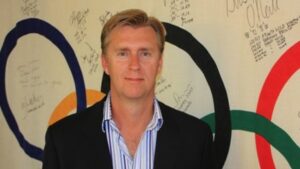
Even before he gained his Bronze qualification (on 2 January, 1982) Rob Woodhouse was already an accomplished surf lifesaving performer, with a silver medal in the Cadet Run-swim-run from the 1980/81 Australian titles. Over the ensuing decade he achieved the remarkable feat of combining top level surf and pool swimming, including medaling at the Olympics and Commonwealth games and selection for several Victorian surf teams, as well as the time-consuming role of Point Leo Club Captain for five years, and generally being one of the main movers and shakers in the club during the 1980s.
Born in 1966 and an imposing 1.90m tall, Woodhouse was Australia’s best competitor in the grueling Individual Medley events (200m and 400m), and despite the distractions of gaining university degrees, getting married and his surf lifesaving commitments, he became the only Australian male to win a medal in the 400m Individual Medley (a bronze at Los Angeles, 1984). Woodhouse also gained selection for the 1988 Seoul Olympics, where he was unplaced. He also medaled at the 1986 Edinburgh and 1990 Auckland Commonwealth Games, before retiring from pool swimming in 1990.
From the 1980s to the mid-nineties Woodhouse was a regular member of Victorian State Surf Teams. He won several Open Surf Race Championships at Victorian titles and was highly placed in surf and belt races at the Nationals. In 1991 he joined the small and select group of Point Leo members to win a national title after his narrow victory in the Australian Over 24 Surf Race event. In 1992/93 he captained the state team and in 1994, his final year in serious competition, he was again a member of the state team after winning yet another State Open Surf Race title. It is hard to think of any other Point Leo member who has sustained such a level of competitive excellence for so long.
David Wilson
David Wilson was born in 1966 and passed his bronze exam at Point Leo on 1 January, 1989, after having gained selection in the Australian team for the 1988 Seoul Olympics as a butterfly swimmer. In the 100m butterfly in Seoul he produced a fine time of 55.54 seconds to win his heat but was unable to make the final of the event. In the 200m butterfly he also won his heat and finished an excellent sixth in the final in a time of 1:59.2.
Toby Haenen
Like Wilson, Toby Haenen passed his bronze exam at Point Leo on 1 January, 1989. He was born in Launceston on 8 October, 1973 and was a crack backstroke swimmer in the pool and a very useful surf swimmer as well. Haenen made his international debut in the Australian team for the 1992 Barcelona Olympics but was unable to make the finals in the 100m and 200m backstroke events. At the 1996 Atlanta Olympics Haenen swam the backstroke leg in the heats of the 4x100m medley relay, the team making the final in this event. In the final he was replaced in the team by another swimmer and the team finished third to teams from the USA and Russia. However, as a team member in the heats Haenen was also awarded a bronze medal.
Haenen also had a fine record in the surf. He won the 1989 Victorian Cadet Surf Race title and finished second in the 1989 Australian Under 15 Run-swim-run event. The following year he won the Victorian Junior Surf Race and at the 1991 State titles he won the Under 18 Sprint Swim. In 1991/92 Haenen won the inaugural Point Leo Swim Classic over 1200m.
Jon Doak and Robert Doak
Born in 1957 and 1958 respectively, Jon and Robert Doak from Rosebud came to Point Leo from a kayak paddling background. As kayak paddlers they were attracted to the Double Ski event at surf carnivals but kayak training took precedence.
As reported in the club’s 50 year history, “A more awesome double ski combination this club has never seen! Those of us who saw them paddle 100 metres further than the hottest field ever assembled for a Double Ski State championship (in 1981/82), to avoid the carnage around the buoys, will never forget the sheer power and precision they showed paddling to a bronze medal that day.” Bob Doak also won the B Grade Single Ski event.
The brothers made the Australian team for the 1984 Los Angeles Olympics in the Men’s Kayak Fours (with Raymond Martin and Scott Wooden) where the quartet finished out of the medals in a very respectable seventh place.
Point Leo honours the 1984 Olympians
A special club dinner in November 1984 attended by 110 people honoured the four Point Leo SLSC members in the Australian Team for the Los Angeles Olympics.
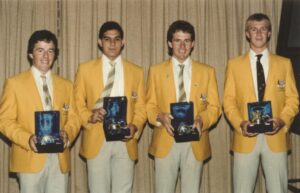
Jon Doak, Greg Fasala, Robert Doak and Rob Woodhouse
Cameron McFadzean
Born in 1971 in Melbourne, rowing at Haileybury College exposed the future dual Olympian to water sports but it was ski paddling that mainly interested him.
According to Point Leo’s 50 year history, “With no prior experience it was obvious that Cameron was a rare talent and he quickly became competitive in Open Ski competition. At the State Titles in 1995 he teamed with Clayton McDonald to win the B Grade Double Ski state title. Half an hour later they lined up in the final of the Open Double Ski after winning their semi-final comfortably. The gun went off and the flurry of paddles was interrupted by a huge ‘crack’. Cameron had snapped his paddle. Game over. After this came a yearning to race in a purer environment.”
He switched to Kayak paddling and won a National title in the K1 1000m followed by a meritorious ninth place finish in the K-1500 event at the Atlanta Olympics in 1996. McFadzean also made the Sydney Olympics in the K-4 1000m crew which finished sixth in their heat and seventh in their semi-final.
David Culbert
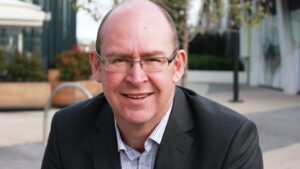
At the time Australia’s number one long jumper, David Culbert joined Point Leo at the urging of fellow Olympian Rob Woodhouse who had spotted Culbert’s obvious potential as a beach sprinter. Born in 1967 Culbert passed his bronze exam at Point Leo on 20 December, 1992 and a few weeks later duly won the State Beach Sprint title “in a canter” according to a contemporary account.
In an international long jump career that spanned 10 years, Culbert won two Commonwealth Games silver medals in 1990 and 1994. He gained Olympic selection for Seoul in 1988 but was unable to make the final of the long jump. However he made amends four years later in Barcelona, putting in a solid performance in the long jump final but finishing outside the medals.
Culbert is a familiar media figure as an expert commentator on track and field events at the major games.
